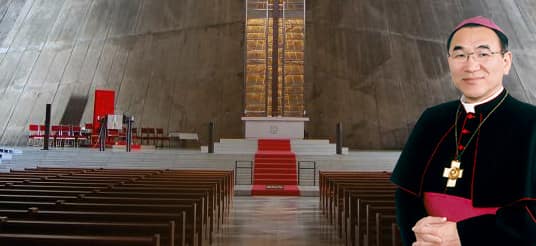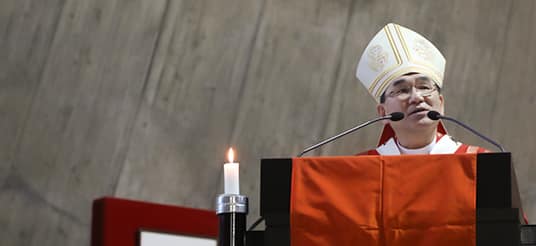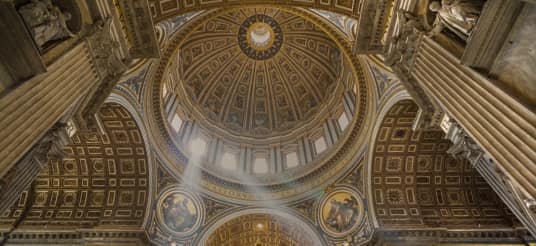Archdiocese of Tokyo

Scripture Readings and Homily for the Mass of Accession of Most Reverend TARCISIUS KIKUCHI ISAO as Archbishop of Tokyo
St Mary’s Cathedral, Tokyo, December 16, 2017
The Epistle of St Paul to the Romans (12:2-10)
(1 I appeal to you therefore, brothers and sisters, by the mercies of God, to present your bodies as a living sacrifice, holy and acceptable to God, which is your spiritual worship.) 2 Do not be conformed to this world, but be transformed by the renewing of your minds, so that you may discern what is the will of God—what good and acceptable and perfect.
3 For by the grace given to me I say to everyone among you not to think of yourself more highly than you ought to think, but to think with sober judgement, each according to the measure of faith that God has assigned. 4 For as in one body we have many members, and not all the members have the same function, 5 so we, who are many, are one body in Christ, and individually we are members one of another. 6 We have gifts that differ according to the grace give to us; prophecy, in proportion to faith; 7 ministry, in ministering; the teacher, in teaching; 8 the exhorter, in exhortation; the giver, in generosity; the leader, in diligence; the compassionate, in cheerfulness.
9 Let love be genuine; hate what is evil, hold fast to what is good; 10 love one another with mutual affection; outdo one another in showing honor.
The Holy Gospel according to John (1:1-18)
1 In the beginning was the Word, and the Word was with God, and the Word was God. 2 He was in the beginning with God. 3 All things came into being through him, and without him not one thing came into being. What has come into being 4 in him was life, and the life was the light of all people. 5 The light shines in the darkness, and the darkness did not overcome it.
6 There was a man sent from God, whose name was John. 7 He came as a witness to testify to the light, so that all might believe through him. 8 He himself was not the light, but he came to testify to the light. 9 The true light, which enlightens everyone, was coming into the world.
10 He was in the world, and the world came into being through him; yet the world did not know him. 11 He came to what was his own, and his own people did not accept him. 12 But to all who received him, who believed in his name, he gave power to become children of God, 13 who were born, not of blood or of the will of the flesh or of all the will of man, but of God.
14 And the Word became flesh and lived among us, and we have seen his glory, the glory as of a father’s only son, full of grace and truth. 15 John testified to him and cried out, “This was he of whom I said, ‘He who comes after me ranks ahead of me because he was before me.’” 16 From his fullness we have all received, grace upon grace. 17 The law indeed was given through Moses; grace and truth came through Jesus Christ. 18 No one has ever seen God. It is God the only Son, who is close to the Father’s heart, who has made him known.
Homily
These words from the beginning of John’s Gospel have just been read: “There was a man sent from God, whose name was John. He himself was not the light, but he came to testify to the light” (Jn 1:6,8). John the Baptist himself was not the light, but was a witness to the light. This is also the mission of our Church in Japan today. I feel that it is our mission to carry on the mission of John the Baptist. We ourselves are not the light. We receive the light and we should witness to the light.
Let us reflect again what the evangelizing mission of the Church in Japan should be.
It has been 468 years since St Francis Xavier brought the Gospel to Japan in 1549. Many excellent and outstanding missionaries of the Gospel have dedicated themselves to the mission of evangelizing Japan. However, I feel that the present situation of Japan still has a long way to go. I think we are still at the stage where the Old Testament becomes the New Testament. Surely, at this present time, don’t we need to carry on the role of John the Baptist and give careful and sincere witness to the Gospel of joy which is Jesus?
In 1987 the Catholic Church of Japan held what was called The National Incentive Convention for Evangelization (NICE-1) and adopted as its aim: “building an open Church.” “To whom should the Church be open?” you may ask. It is to the poor and the powerless in society.
The Lord Jesus became the friend and companion of people who were regarded as sinners, people who were despised, people suffering from illnesses and handicaps, people who were discriminated against. We want to learn from Jesus how to be a Church which is friendly to those who are aware of their weakness and sinfulness. We want to be a community which welcomes and offers solace to the physically and psychically ill and those who suffer from various disabilities. We want to befriend and encourage people who wander about in darkness and have lost sight of any purpose in life. Many people are so lonesome they can no longer see any reason for living. Everyone would like to enjoy human relations in which they are respected and treated as meaningful.
It is painful to hear people say that they hesitate to set foot in a church, or that they went once but no one paid any attention to them. We want to be a church community that can be seen as open for anyone to enter and feel welcome.
People are truly looking for salvation, which can be seen in actual statistics, in the statistics of those who take their own life. The actual cause of death among young people in Japanese society today is something we must take to heart. Statistics show that suicide is the major cause of death among people from 15 to 39 years of age. This is a very sad and regrettable situation. How should we religious people respond to this problem? In order to improve the situation, the Catholic Church in Japan must exert all its effort and offer its prayers for this purpose.
So our mission as Church, is to show forth the light of Christ that we have received and become the body of Christ enlivened by the Holy Spirit. There are many members in the body of Christ, each with a different function. All of these are brought together into the one work of Christ. In today’s first reading, the Apostle Paul gave us a surprising admonition: “Love one another with mutual affection; outdo one another in showing honor.” (Rom 12:10) How is this admonition carried out among us? Don’t we rather point out failings and belittle one another? I hope we shall rather esteem one another’s strengths and merits, acknowledge each person’s role and ministry, and respect one another.
In fact, it is not easy to put these words of St Paul into practice. As he had previously declared in his first letter to the Corinthians, there were divisions and confrontations in the church of Corinth (1 Cor 1:10-17). The gospels, too, tell us that even the 12 disciples were quite concerned about who was the greatest among them (Mk 9:33-37, Mt 13:1-5, Lk 9:45-48). On the other hand, we are also told that people outside the church, on seeing the first generations of Christians, said in admiration, “See how they love one another!” This surely shows that the following words from the Gospel of John were put into practice: “Just as I have loved you, you should also love one another. By this everyone will know that you are my disciples” (Jn 13:34-35). The Church grew and expanded thanks to the witness given by Christians through their love.
If people who suffer and find it difficult to live in this tempestuous society of present-day Japan can see us living in close companionship, helping and loving and forgiving one another, perhaps that could be called our greatest evangelizing mission.
Most merciful Jesus, pour out your Holy Spirit on us gathered here today, and grant us the grace to learn from you how to show forth the mercy of God in our daily life. Amen.





